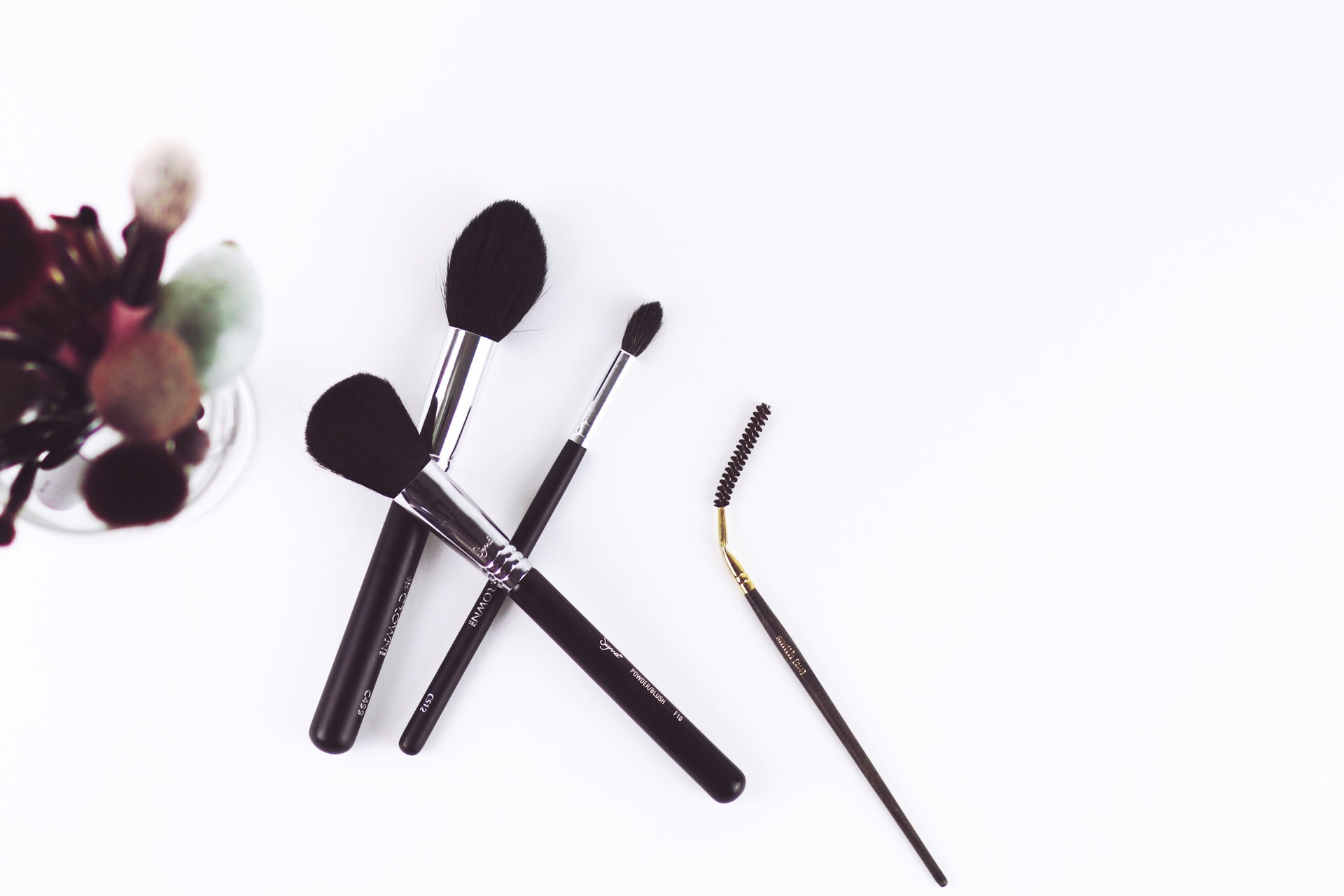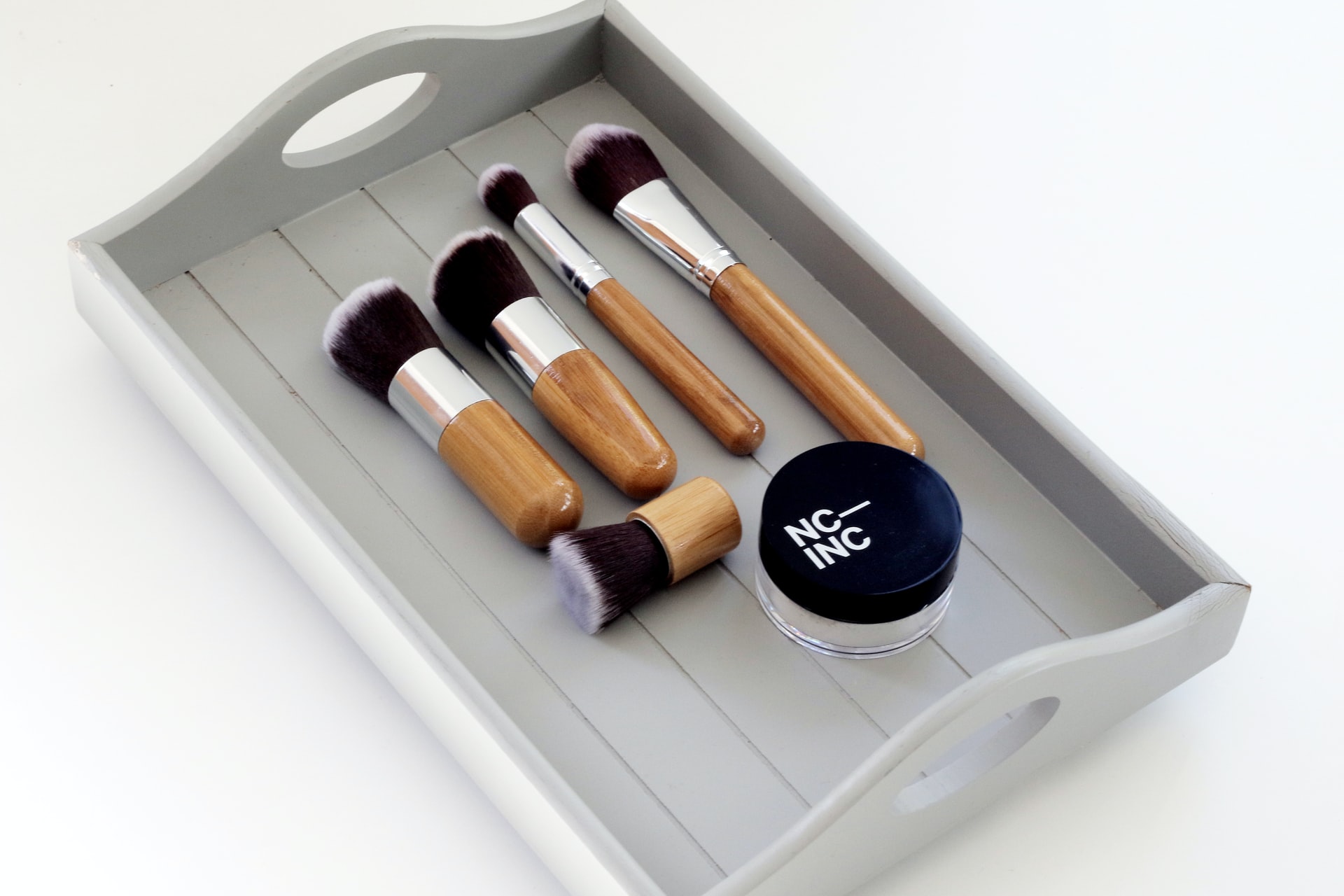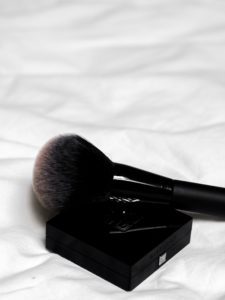
Choosing makeup brushes can be super overwhelming, whether you’re a professional makeup artist, a makeup enthusiast, or even just a basic everyday makeup wearer. I get asked about brushes SO much, so I thought it was about time that I put my thoughts together in a blog post!
I highly suggest you bookmark this page because I guarantee you’ll be shopping for makeup one day and think to yourself, “wait, do I really need this brush?” Of course, if you want to learn more about how to use your brushes to achieve a gorgeous everyday makeup look, you can find that in my book, Be Your Own Makeup Artist. 😉
Less Is More. (You’ve heard me say this a lot)
Sure, having a huge makeup collection with tons of brushes might be fun, the truth is, most of us can get by with just 2-3 brushes. Even as a professional makeup artist, I’ve had to do super quick applications for a client and I’ve pulled double duty on brushes and guess what? It works just fine!
I get it. It’s so much fun to watch makeup tutorials and see all the fun brushes people have and use, but it’s important to remember that most of the time, these people are getting these things for free from brands. They’re not spending their own money, and if they had to, I doubt they would even own half of them. You do not need 29 makeup brushes. Trust me.
Not convinced? What if I told you that many professional makeup artists, myself included, often use their (clean) fingers instead of brushes to apply makeup to themselves and their clients. There are many cases where fingertips just work better. I make a point to note these cases in my book because I really feel that if something you already own works great, you don’t need to go out and buy something new. Call me crazy, but that’s just what I practice AND preach!
So, if you don’t need dozens and dozens of brushes, which ones DO you need to have in your makeup kit?
Choosing Makeup Brushes
Brushes are an essential part of your makeup kit, so knowing how to shop for the right brush is so important. With the right tools (not necessarily the most expensive ones), your makeup will look better, apply easier, and last longer.
1. Choose Quality Over Quantity
Always invest in quality brushes. Again, you don’t need a lot of brushes; you just need the right brushes. When choosing a brush, remember that a high price point doesn’t necessarily mean high quality. Select quality items and keep in mind that if you take care of your brushes (and clean them regularly) they will last a while, so look at it as a long-term investment.
2. Avoid Buying Sets
Avoid purchasing brush sets at all costs. Yes, it’s tempting to buy them; after all, they look so pretty organized nicely in that little carrying case. But here’s the harsh truth: sets normally contain a bunch of brushes that wouldn’t normally sell well on their own and I bet you won’t even reach for half of them. It’s really just such a waste of money.
3. Know Which Makeup Brush Does What
Choosing the right makeup brush is not just about watching a YouTube video and buying everything they recommend. It’s also not about reading this blog post and buying every single brush I mention. When choosing your makeup and brushes, it’s important that you do your homework and decide which products work best for you… not someone else.
Makeup Brush 101

I want to empower you with the knowledge you need to buy the best brushes for your preferred makeup look, so here’s a little more info on some of the most popular kinds of brushes and what each of them is used for.
Keep in mind: this is not a complete list. My goal is to help you recognize the most popular brushes that you will see in the makeup brush aisle. I want you to be able to pick up the ones you need and skip the ones you don’t.
Stippling Brush: This kind of brush is perfect for buffing liquid, cream, or mousse foundation. Use small, circular strokes to blend.
Foundation Brush: Use this flat brush to apply liquid foundation by swiping back and forth until it’s all blended.
Powder Brush: This is a large, fluffy brush that’s perfect for applying powder over the top of your liquid foundation.
Setting Brush: This smaller version of the powder brush is perfect for locking in your foundation and concealer with setting powder.
Fan Brush: You will use this thin, flat brush for applying highlighter, blush, and bronzer. This is one I normally tell people they can skip. I actually use my favorite setting brush for this!
Blush Brush: This is a medium-sized blush that is great for applying and blending blush and bronzer.
Angled Cheek Brush: This slanted brush is ideal for various applications, such as blush, bronzer, and contouring.
Lip Brush: If you want to apply lipstick more precisely, you can use this small, flat brush. Most everyday makeup wearers don’t need to invest in a lip brush, in my opinion.
Eyeshadow Brush: This is a flat brush that comes in both large and small sizes, perfect for applying eyeshadow.
Crease Brush: The slight angle of this brush helps get into the crease of the eyelid. This is for more “advanced” eyeshadow applications.
Blending Brush: This small, fluffy brush is ideal for blending different shadow colors for a more natural look.
Eyeliner Brush: This angled brush makes applying gel eyeliner a breeze. If you like to use eyeshadow as an eyeliner, this is a great brush to have, too. You can even use it to fill in brows!
Eyebrow Brush: This kind of brush usually has a comb on one side and a spoolie on the other to groom brows and make them look fuller.
Beauty Sponge: This bulb-shaped sponge is good for patting and blending liquid foundation and concealer. You HAVE to wet the sponge before using it or it will soak up all your product.
Kabuki Brush: Use this short, stubby brush to apply powder foundation in small circular motions. You can use it lightly to apply blush or bronzer, too.
PS: check out this infographic from my book Be Your Own Makeup Artist and save it on Pinterest!

Which Makeup Brushes Do Beginners Need?
If you are a makeup beginner and you want to build a nice makeup kit, resist the urge to buy a makeup brush set. Instead, here is a list of brushes I believe are essential for beginners:
- 1 brush to apply foundation (or a quality beauty sponge)
- 1 brush for contouring/blush/highlighting (like a setting brush)
- 1 eyeshadow brush
- 1 eyeliner brush
- 1 eyebrow brush
How to Take Care of Your Brushes
Once you invest in some brushes, you need to learn how to take care of them. Brushes are made to last a while, as long as you clean and store them properly.
When washing your brushes, use a mild cleanser to maintain quality. My favorite (and the most cost-effective option) is baby shampoo! It’s so gentle, but it still gets the job done. I’ve used Johnson & Johnson’s baby shampoo for probably 15 years. I still use that on my own brushes, but I splurge a little and use Sonia Roselli Tiger Eye Soap for my pro kit.
For makeup sponges, you will want to use something a little different. I use Beauty Blender beauty sponges, so I can only speak to that, but I double cleanse using Beauty Blender Liquid Cleanser followed by Beauty Blender Solid Pro (you can use this for brushes too, it’s just a little more pricey.)
PS: Want some quick insights about makeup brushes for beginners?! Check out this video I’ve recorded about the topic!
Psst.. If you want to know more about how to wash and sanitize your brushes and the rest of your makeup, grab a copy of my free Makeup Sanitation Guide!

I hope this post has cleared up some of the mystery surrounding makeup brushes. I always aim to make things as easy as possible for people, but if you have any questions, feel free to leave a comment or reach out to me using the Ask Setareh form on my website!
Beauty is about perception, not about make-up. I think the beginning of all beauty is knowing and liking oneself. You can't put on make-up, or dress yourself, or do you hair with any sort of fun or joy if you're doing it from a position of correction.
kevyn aucoin


